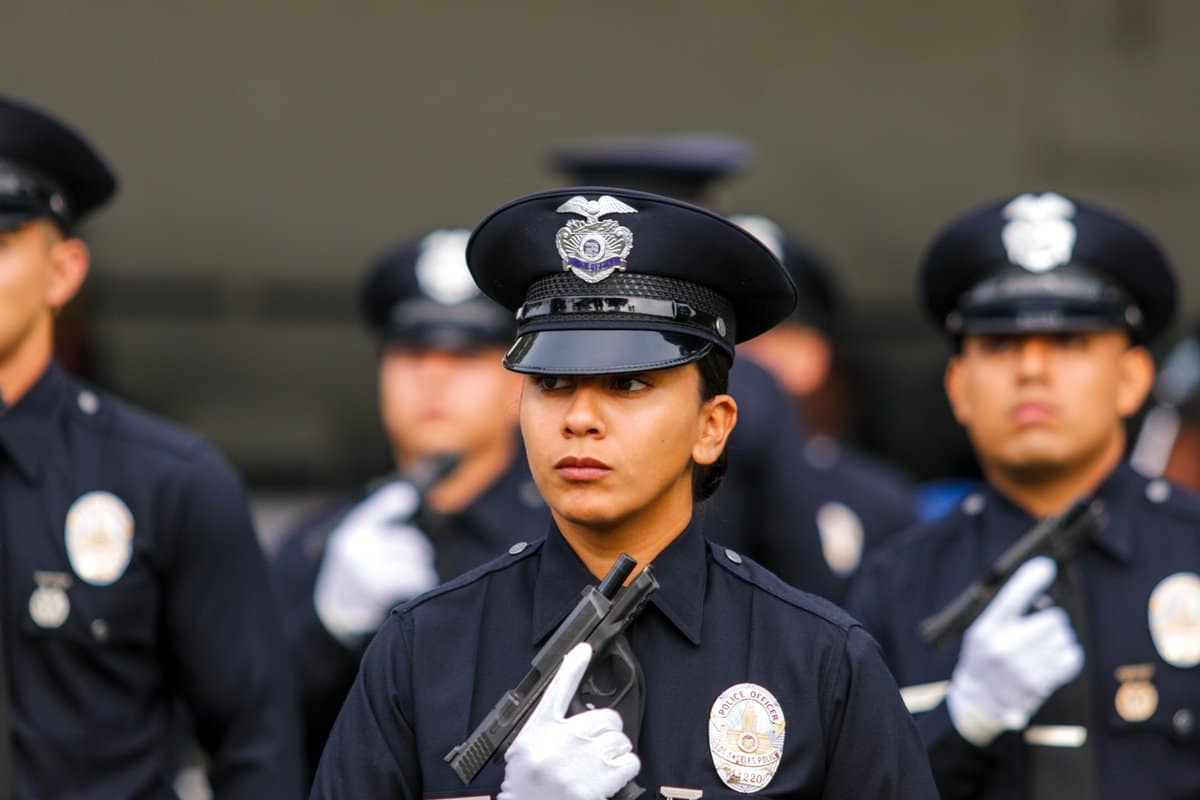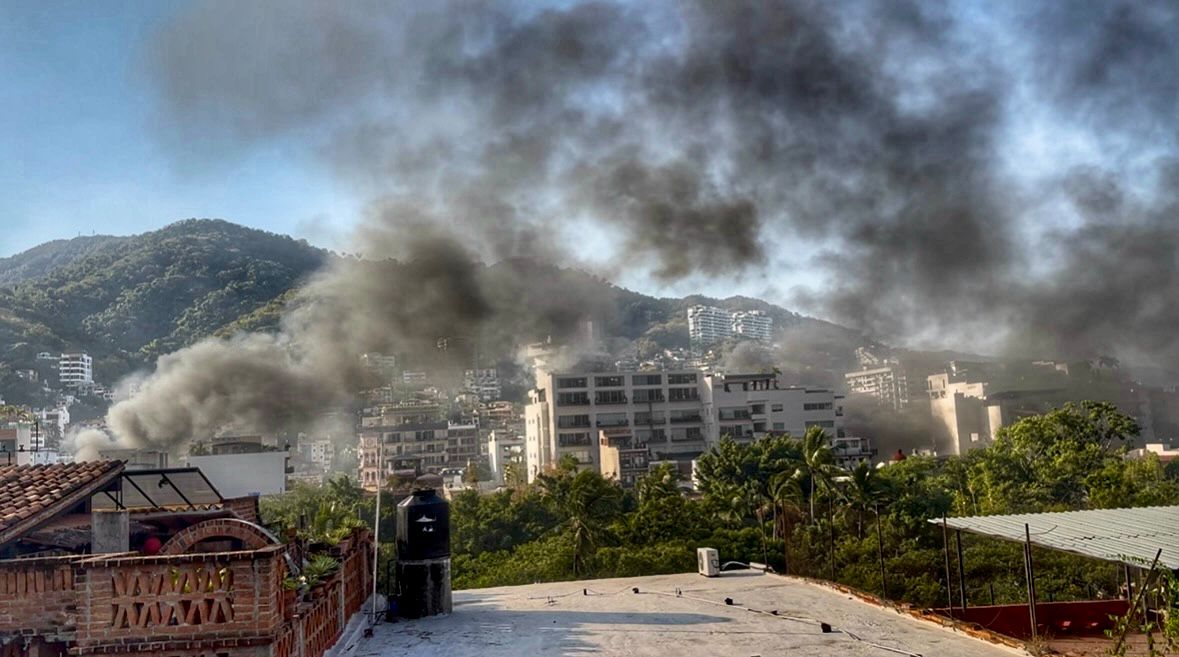[dropcap size=big]I[/dropcap]n 2017, LA Mayor Eric Garcetti and the Los Angeles Police Department created the Associate Community Officer Program (ACOP) as a pipeline for recent high school graduates, some younger than 18 years old. He wanted the program to be a bridge connecting young people to police after public reception towards policing shifted following the Ferguson uprisings of 2015 and 2016. Officer Johnny Gil, who helped to launch the program, called it an opportunity to create “super cops.”
To create said “super cops,” LAPD has targeted poor Black and Brown communities, like many of its other youth programs. Ninety-seven percent of the program’s participants are Latinx and Black.
But in the weeks following the onset of the George Floyd protests, roughly one in five members of the program abruptly resigned, hinting a shift in the relationship between young people and police. It also alludes to contention over-policing power in Black and Brown communities.
The program which is budgeted for upwards of $1 million is supposed to have 50 members. After the slew of resignations, it now only has 35. LAPD Captain Aaron McCraney of the Recruitment and Employment Division didn’t acknowledge this sudden uptick of resignations as a trend. “ACOs leave for different reasons,” McCraney said in an email to L.A. Taco. “Some pursue other careers; some decide to further their education and others ‘age out.’”
Thrilled to see Mariyah Delgado join the ranks of our @LAPDHQ today! Officer Delgado is our first LAPD Academy graduate from our #PledgeToPatrol program, which helps more young Angelenos pursue their dream of a career as a police officer. pic.twitter.com/fdcsUWLUu6
— MayorOfLA (@MayorOfLA) September 28, 2018
Though the numbers and supposed program goals tell a different story, comparing personnel changes from the month before George Floyd’s murder to the month after, there was a 600 percent increase in resignations. And according to the program’s goals, participation in the program was designed to allow ACOPs to continue their college studies while still being employed by LAPD.
For Hamid Khan of the Stop LAPD Spying Coalition, the resignations highlight a growing loss of “absolute power” by policing bodies that extends much further than just losing participants in a youth program. The coalition works to dismantle “government-sanctioned spying and intelligence gathering, in all its multiple forms.” Khan says the severing of a police pipeline in Black and Brown communities is of “universal and global importance” because of the international aspects of policing.
“It may be a change of conscience for these specific young people because there is the fear of being implicated in something,” says Khan. “But, it's not about them, it's about the system. The [policing] system, rooted in slave patrols, is a globally occupying force with the authority to kill.”
“It seems like a weird way of getting young kids comfortable enough to not even question the presence of a cop...”
And on a local level, the quick incline in resignations points toward a dynamic shift in the relationship between younger generations and how police present themselves in their communities. For some, this relationship was tainted by what has been called predatory recruitment practices.
Fifty-seven percent of ACOP participants identify as Latinx women. This polarizing figure draws a stark comparison to the US Army, who is being forced to reckon with their recruitment along racial lines after the murder of a 20-year-old soldier, Vanessa Guillén. In L.A. and across the country, protesters have chanted “'If you can’t protect them, don’t recruit them,” in response to the Army’s negligence in protecting women of color recruits.
In order to participate in the ACOP program, you have had to have participated in one of the three LAPD youth programs. The first member of the ACOP program to move up the ranks to a full-time police officer after being recruited as a teenager was Mariyah Delgado in 2018. Delgado said the program better prepared her for the transition to Sworn Officer compared to most recruits.
But experiences with recruiters and cop-funneling projects can have other subtle effects on young people. To advertise and market these various initiatives, LAPD has a long history of tabling at high schools throughout the city.
Tiffany, whose last name is withheld for safety precautions, says during her high school career, LAPD recruiters came around multiple times. At the time, she didn’t overthink it. She says the recruiters would wait for people to walk to their table, sometimes calling out students in passing. But when looking back, she believes that some of their “marketing” practices were inappropriate.
Supporters of community-based policing practices believe that police and the act of policing become less violent if cops come from the same demographics as the communities they police. However, activists argue that various community policing models are often just as insidious and violent as any other form of policing.
“It seems like a weird way of getting young kids comfortable enough to not even question the presence of a cop,” says Tiffany. “Especially when they had candy or merchandise to hand out.”
Opponents of the program contend that this deliberate targeting of racial minorities is not actually about protecting communities of color or building a more benign form of policing.
The ACOP initiative was touted to be an attempt to develop a ‘community policing’ standard. Supporters of community-based policing practices believe that police and the act of policing become less violent if cops come from the same demographics as the communities they police. However, activists argue that various community policing models are often just as insidious and violent as any other form of policing.
“When LAPD says ‘community policing,’ they already have a very specific community in mind,” says Jamie Rae, a registered nurse and community organizer based in Boyle Heights. “It’s not people who are struggling with money, housing, and access to education. It's not women, queer, trans, gay, and intersex people.”
“They want people who deal with problems by engaging with the police. They want people who are driving and utilizing the police for protection of property and land, who are upper-class folks,” Rae added.
Recently the Stop LAPD Spying Coalition began organizing to disband the LAPD Data-Informed Community-Focused Policing project. Using the SARA model, Scanning, Analysis, Response and Assessment, the project encourages the community “to build trust, using information that’s accurate and fair, and focuses on solving crime problems in specific places.”
Los Angeles City Councilmen Joe Buscaino and Marqueece Harris-Dawson proposed that “it is time to expand the Community Safety Partnership (CSP) program within LAPD and begin to transform the department into one based upon community policing.”
Data shows that those specific places are in the West and Valley bureaus of LAPD, which are the most affluent in LAPD’s jurisdiction. According to the last three years of data released by the Office of the Inspector General, roughly 60 percent of the community informed suspicious activity reports (SARs) have come from those two bureaus. In 2016 and 2017, 100 out of 206 SARs in the West and Valley bureaus were found to be not credible. That means 100 people were targeted, surveilled, and harmed by the police just for existing in these certain spaces.
Yet, seemingly, many members of the L.A. political sphere have doubled down on community policing. Los Angeles City Councilmen Joe Buscaino and Marqueece Harris-Dawson proposed that “it is time to expand the Community Safety Partnership (CSP) program within LAPD and begin to transform the department into one based upon community policing.”
As a result, within weeks of the City Council slashing $150 million from the LAPD budget, they rerouted an “unbudgeted” amount of money to expand the CSP program. LAPD has also created a new bureau specifically for CSP.
In their proposal, Buscaino and Harris-Dawson cited a UCLA study, whose funders included the Ballmer Group and the Caruso real estate company. The study found that the CSP program had prevented crime and made residents feel safer. Buscaino, an LAPD reserve officer, was a part of the research committee at UCLA.
Rae points out that when organizations call for defunding the police, they mean exactly that. That doesn’t mean more Black or Brown officers or expanding its various community-infiltrating practices.
The funders of this research, two groups heavily involved in property and real estate, set a dangerous precedent when considering the impacts of property values and gentrification around policing measures. Breonna Taylor, whose murder also catalyzed rebellions against police violence, was killed during an alleged warrant linked to a gentrification plan. Studies show there is a direct link between gentrification and over-policing.
Both Buscaino and Harris-Dawson did not respond to multiple requests for comment.
Khan said this move by City Council marks an interesting historical shift in city politics.
“There used to be a clear separation between law enforcement and legislative bodies,” says Khan. “But what we have seen now is that legislative bodies are increasingly being infiltrated. Whether people are reserve cops, like Joe, or fierce supporters of cops, the idea of law and order has been maintained even if its actually created disorder.”
A dissenting study conducted by the nonprofit Urban Institute found that residents living in areas supported by the CSP program didn’t necessarily think that decreased crime in their areas was due to the program and “generally” do not trust the police. Interviewees also expressed concerns about mistreatment from the police. Rae points out that when organizations call for defunding the police, they mean exactly that. That doesn’t mean more Black or Brown officers or expanding its various community-infiltrating practices.
“People didn’t ask for community-based policing or Community Safety Partnerships, they asked to redirect the budget towards the needs of the people,” says Rae. “What LAPD tries to do is to dissect situations to continue to build power.”






